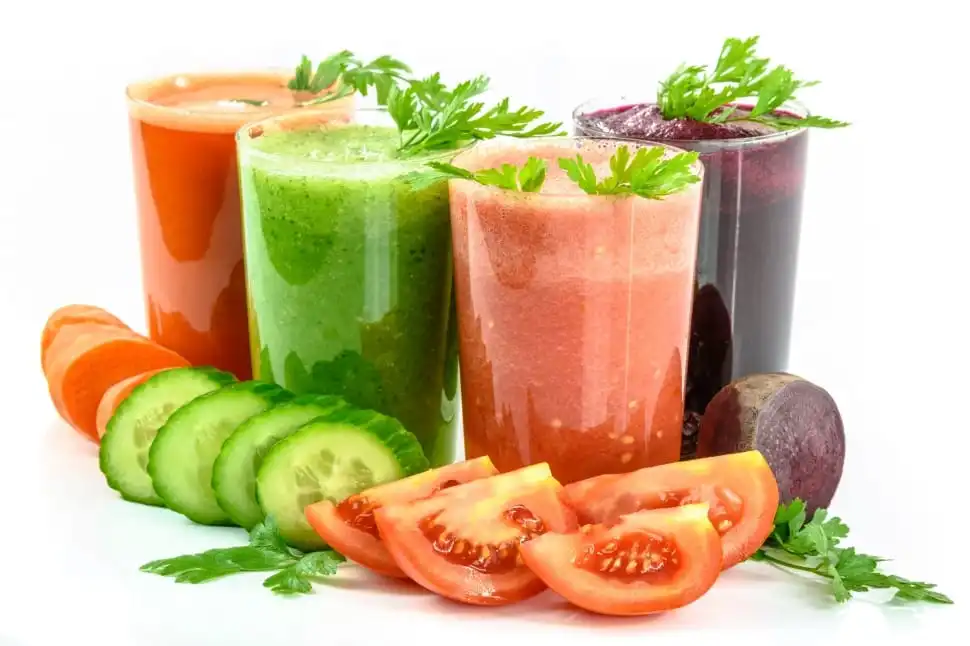Juicing vegetables is a great way to pack a lot of nutrients into your diet. However, you might be wondering when the best time to drink vegetable juice is.
After all, you want to make sure that you’re getting the most out of your juicing habit!

Table of Contents
The Best Time to Drink Vegetable Juice
Here’s a look at the best time to drink vegetable juice, based on what type of nutrients you’re looking to get from your juice.
Note: It’s always best to use freshly made vegetable juice for maximum nutrient absorption. Always consult with a healthcare professional before making any major changes to your diet.
Vitamin C: First Thing in the Morning
One of the most important nutrients in vegetable juice is vitamin C. This essential nutrient helps boost immunity, fight inflammation, and promote collagen production.
If you’re looking to get the most vitamin C from your vegetable juice, drink it first thing in the morning on an empty stomach.
That way, your body will be able to absorb all of the vitamin C without any interference from other foods or beverages.
Some vegetables that contain much Vitamin C: Bell peppers, broccoli, kale (beneficial for weight loss), Brussels sprouts, cauliflower, tomato, spinach, etc.
You can also read details about the best morning vegetable juice recipes and their benefits.
Fiber: With a Meal
Fiber is another important nutrient that you can get from vegetable juice. Fiber helps promote digestive health and can even help regulate blood sugar levels.
If you’re looking to get the most fiber from your vegetable juice, drink it with a meal. That way, the fiber will help slow down digestion and promote satiety.
Just be sure to avoid juicing vegetables that are high in fiber, like carrots and beets. These vegetables can actually cause constipation when juiced!
Some vegetables that contain much fiber: Celery, cucumber, zucchini, cabbage, kale, spinach, etc.
Potassium: Before or After Exercise
Potassium is an electrolyte that’s important for proper muscle function. If you’re an athlete or just enjoy working out, it’s important to make sure that you’re getting enough potassium in your diet.
The best way to do this is to drink vegetable juice before or after exercise. That way, you’ll replenish your electrolytes and help prevent cramping or fatigue.
Just be sure to avoid juicing vegetables that are high in potassium, like spinach and kale. Too much potassium can actually be dangerous for people with kidney problems!
Some vegetables that contain a lot of potassium: Swiss chard, tomato, avocado, asparagus, cabbage, broccoli, etc.
Protein: Anytime
Protein is important for muscle growth and repair, as well as overall health.
While some vegetable juices may contain small amounts of protein, it’s not the main source of this nutrient in most people’s diets.
Therefore, it doesn’t really matter when you drink your vegetable juice in relation to getting protein. Just make sure that you’re getting enough protein from other sources in your diet, like lean meats and beans.
Some vegetables that contain much protein: Spinach, broccoli, kale, cauliflower, Brussels sprouts, peas, etc.
Some FAQs:
As long as you’re not overdoing it on certain nutrients (like potassium), there’s no harm in drinking vegetable juice every day. However, it’s important to also incorporate a variety of whole fruits and vegetables into your diet for added fiber and satisfaction.
Sure! Just be aware that adding fruits to your vegetable juice will add more sugar and calories. So, if you’re looking for a low-calorie drink, stick with just vegetables. But if you want sweeter juice, feel free to mix in some fruits like apples or strawberries. And remember to always wash your fruits and vegetables before juicing them.
While fresh, homemade vegetable juice is always the best option, store-bought varieties can also be a convenient option. Just make sure to check the Nutrition Facts label and ingredients list for added sugars or preservatives. Aim for a brand with minimal ingredients and no added sugars. And remember, it’s always better to eat whole fruits and vegetables rather than relying on juice for all of your nutrient needs.
It’s best to drink your vegetable juice as soon as possible after juicing since the nutrients can start to degrade over time. However, if you need to save it for later, store it in an airtight container in the fridge and consume it within 24 hours. It’s also a good idea to give your juice a quick stir or shake before drinking to redistribute any separated liquid.
Conclusion
As you can see, there’s no one-size-fits-all answer when it comes to the best time to drink vegetable juice. It all depends on what type of nutrients you’re looking to get from your juice.
Just remember to always incorporate a variety of whole fruits and vegetables into your diet, and choose fresh or minimally processed vegetable juice options. Happy juicing!
